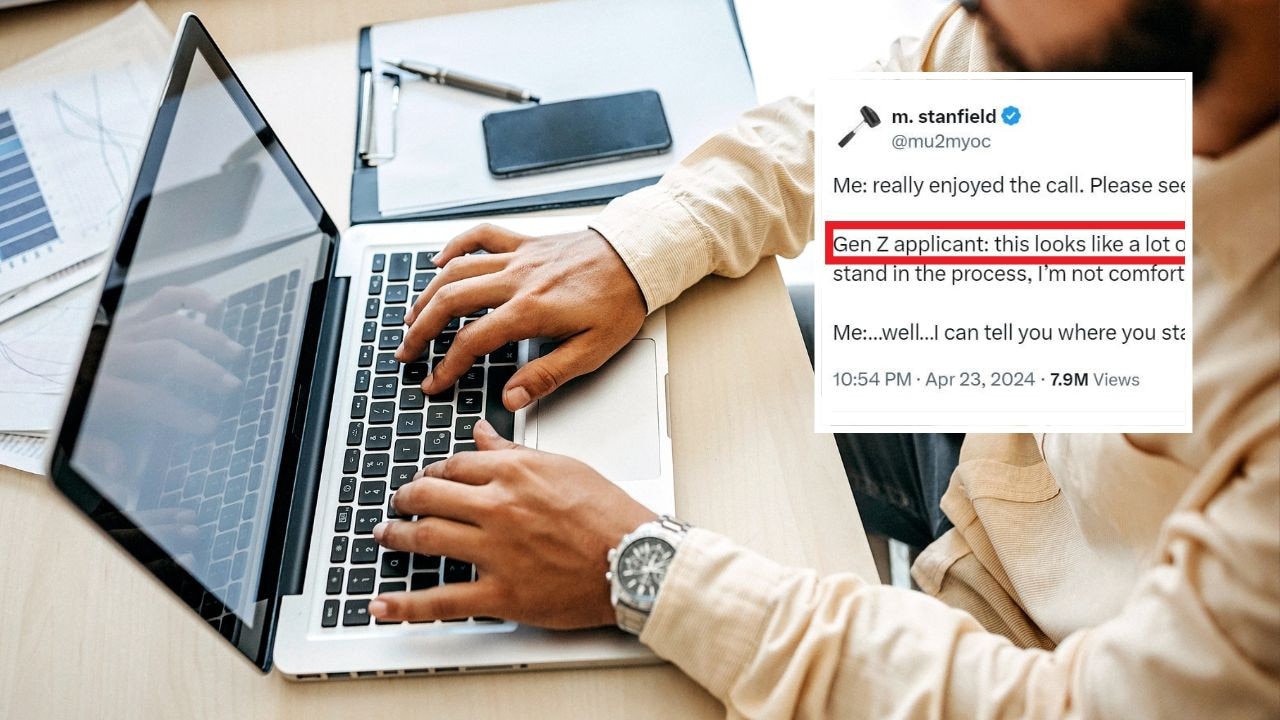‘Boomer mindset’: CEO’s response to Gen Z applicant’s email sparks backlash
A CEO has sparked controversy for his response to a Gen Z job applicant after they sent an email he claims “blew” his mind.

An American CEO has copped major backlash online after revealing he excluded a Gen Z applicant from consideration for a job after they pushed back against a seemingly controversial request.
The employer, who goes by M. Stanfield online recently took to X – formerly Twitter – to vent about the response he received from a job applicant after they were asked to complete a 90-minute unpaid task as part of the interview process.
The CEO, who was hiring for an investment analyst position, shared part of a conversation he had with a Gen Z applicant who was going through the interview process.
“Me: really enjoyed the call. Please see attached financial modelling test,” he wrote on X.
“Gen Z applicant: this looks like a lot of work. Without knowing where I stand in the process, I’m not comfortable spending 90 minutes in Excel
“Me: … well … I can tell you where you stand now.”
The post quickly went viral, gaining more than 7.9 million views in a matter of days.

Providing more context in the comment section of the post, Stanfield said if an applicant couldn’t complete the task in 90 minutes then they “weren’t the right person” for the job.
He also said the email from the applicant “blew his mind” and even seemed to suggest that Gen Z needed to toughen up, claiming the generation would “benefit from being in more fist fights at a young age”.
“A few bumps and bruises does a lot of good,” he wrote.
While there were some who agreed with the CEO, of the 1600 commenters, the majority appeared to be defending the applicant.
People accused the CEO of having a “boomer mindset” and claimed his response was a major “red flag” to potential applicants, adding that it seemed like the Gen Zer had “dodged a bullet”.
“Applicant is right. Unless you offered to compensate for that 90 minutes. He has no idea how many applicants remain in the process. He probably has interviews with other businesses. Effort vs reward definitely not there for this. Good for him,” one person said.
“So they didn’t want to give their time away for free for a job they have no idea if they’re even close to getting, so you ruled them out? Capitalism is grim,” another wrote.
Others claimed that take home portions of an interview should either take less than 30 minutes, or the applicant should be paid for their time.
One added: “I stand with that applicant. I also congratulate them on their professionalism when pushing back on that massive red flag. How hard is it for you to tell a candidate where they stand in a process before asking them to work for free?”
While it seems no payment was offered for completion of the task, the CEO did claim that if the applicant asked him for money he would have “gladly paid”.
“A response I would have actually enjoyed would have been. ‘I’m good at this and don’t work for free. Give me $1000 and I’ll break this deal down in amazing detail’. Would have gladly paid and probably hired,” he wrote.
Speaking to Fortune, the Boston-based CEO – who declined to confirm the name of his company – claimed these types of tasks are common during the hiring process for the industry.
“If you want to get hired as an investment analyst, at least at my fund, you need to demonstrate your ability to analyse an investment,” he told the publication.
Stanfield questioned how an employer was supposed to know if a candidate had the skills to do the job without testing them.
While many of the commenters disagreed with the CEO’s response, there were still those who were on his side.
“Absolutely hilarious reading people who think someone should get paid for an interview assessment,” one wrote.
“You were totally right to not hire them, I wouldn’t want them working for me either with that attitude. What ever happened to people trying hard to secure a job they really want.”

Another person claimed that when they are hiring applicants for their business, they require them to do a one hour graphic design test.
“If people raise concerns about doing an unpaid test, it is the best feeling the world because I know we dodged a bullet,” they said.
Another person claimed that tests are the best way to figure out if someone can do the work required, revealing they often give out tasks that take between one and three days to complete.
However, they also noted that they pay the applicant for their time, regardless of the result.
It’s no secret that Gen Z are taking a very different approach to working compared to the generations that have come before them.
Keeping a healthy work-life balance is a priority for the youngest working generation and they aren’t willing to sacrifice their personal lives just to get ahead at work.
This attitude is evidenced by the spate of new ‘work trends’ that have emerged over recent years as Gen Zers enter the workforce.
Quiet Quitting, Bare Minimum Mondays, Lazy Girl Jobs and Loud Leaving are just a few of the many trends that have been popularised by Gen Z.
Jeremy Chetty, Student Edge Co-Founder and CEO, said these differing priorities means that younger workers will also have a different approach to the interview process, as they want to find a company that aligns with their values.
“Gen Z brings a unique approach to the interview process, characterised by a genuine curiosity so they are able to make well-informed decisions,” he told news.com.au.
“The curiosity from Gen Z signals a deeper level of engagement and a desire to ensure their personal values align with an organisation.”




